Jobs
We sometimes have time-consuming tasks which have to be run sequentially, because tasks take considerable time to complete, users are not able to engage with the whole of the progress.
In this case, we can use Jobs to create a job of sequential multiple tasks and submit the job for execution in the background, meanwhile, we can monitor the progress from the log.
In addition to the Jobs, PrimeHub also provides another feature, Recurring Jobs that we can create recurring jobs which are responsible for submitting jobs regularly according to the recurrence settings.
Jobs
Jobs List
There is a list showing created jobs within the current group with relevant information.
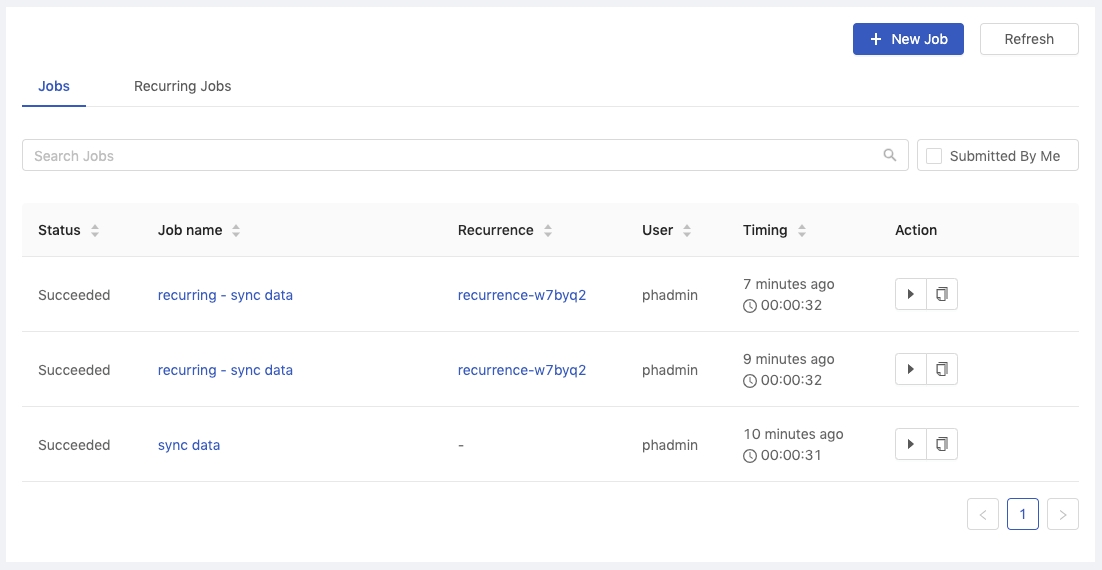
Status
The status of the job. Pending,Preparing, Running, Failed, Succeeded, Cancelled and Unknown.
Job name
The name of the job.
Recurrence
The name of the job recurrence if the job is triggered by the recurring job, otherwise it shows -.
User
The owner who submits the job.
Timing
The duration of the running job.
Action
The action buttons, Cancel, Rerun, Clone.
New Jobbutton: Click the button to create the job.Refreshbutton: Click the button to refresh the list.Job namelink: Click the name to enter the job detail page.Recurrencelink: Click the name to enter the detail page of recurring job if any.Submitted by Meif checked off, it lists jobs ONLY submitted by the user.Search Jobssearch by the Job name.
View Job
Click the job name on the list to view the job information and logs. The job can also be Rerun or Clone into a new job.
Panel
It shows the brief information of the job.

Status
The status of the job. Preparing, Running, Failed, Succeeded, Cancelled and Unknown.
Duration
The duration of the job running.
Finished
How much time ago the job finished.
Recurrence
The name of the recurring job if the job is triggered by the scheduler; clicking the name to enter the detail page of recurring job.
User
The owner who submits the job.
Tabs

Information
Here are the detail information of the job:
Message
Messages returned from job running.
Job ID
The unique id of the job.
Job name
The name of the job.
Creation Time
The time the job is created at.
Start Time
The time the job starts at.
Finished Time
The time the job finishes at.
Group
The group where the the job belongs to.
Instance type
The instance type which the job uses.
Image
The image which the job run based on.
Command
The context of the job.
Artifacts
If a Job generates data so called artifacts under the PHFS storage artifacts/ during the execution, here it lists those artifacts. Meanwhile, in Notebook, these artifacts are stored under /phfs/jobArtifacts/job-xxxxx. See the simple usage of Job Artifacts.
Monitoring
It shows the message "feature not enabled, please contact admin", if underlying prerequisite phfs is not enabled.
Monitoring indicates how much resources the Job use.
15 mins,1 hour,3 hours,Lifetime: Select the latest timespan of metrics; 15min shows metrics of the latest 15mins only, Lifetime shows metrics from the beginning to the end. See The interval of data sampling per timespan.View the average usage within these most recent time frames
Overall Usage: CPU and Memory(MB).GPU Device Usage: GPU and Memory(MB) display if GPU is allocated.
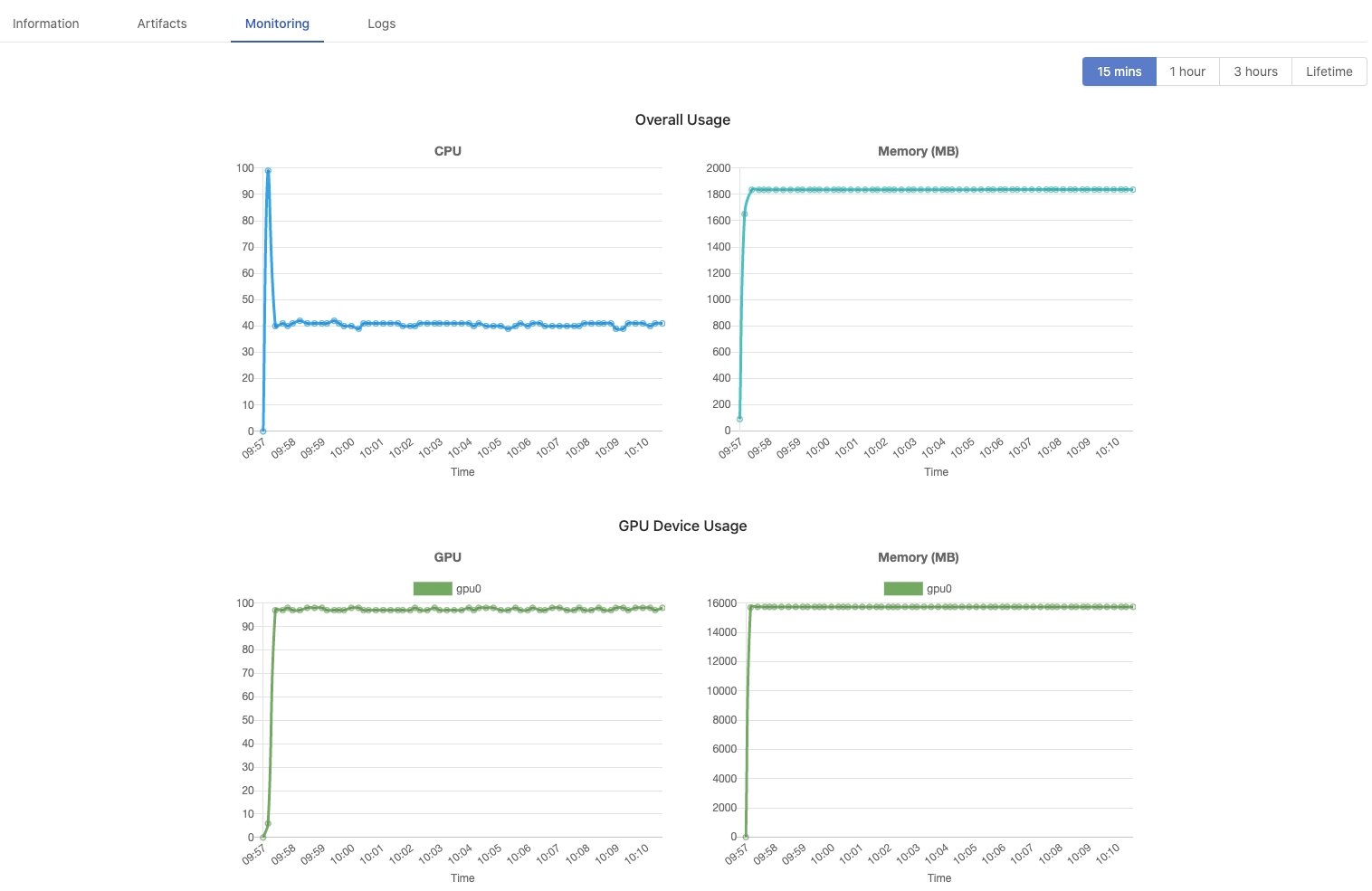
Logs
When a job comes to success or failure, it logs the whole of job running progress. This is where we can check the progress, result or even shoot troubles if failed.
The log viewer here only list the latest 2000 lines of logs. Clicking Scroll to Bottom to check the last logs at the bottom or clicking Download to download a complete log file.
However, when a job comes to cancellation or timeout, there is no log left since the pod has been deleted.
Recurring Jobs
Recurring Jobs List
There is a list showing created recurring jobs within the current group with relevant information.
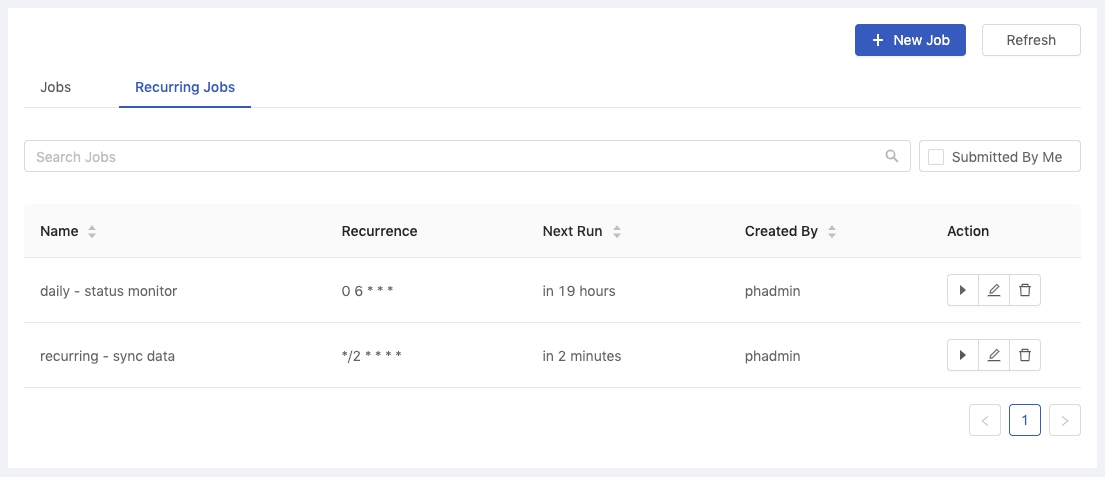
Name
The name of the recurring job.
Recurrence
The recurrence of the trigger if any.
Next Run
Time when a job will be triggered next time.
Created By
The owner of the recurring job.
Action
The action buttons are trigger, edit and delete in sequence.
New Jobbutton: Click the button to create the job.Refreshbutton: Click the button to refresh the list.Submitted by Meif checked off, it lists jobs ONLY submitted by the user.Search Jobssearch by the Job name.
Create Job/Recurring Job
Confirm if the current group is what you desire; switch the group by the Group: dropdown in the upper right corner.
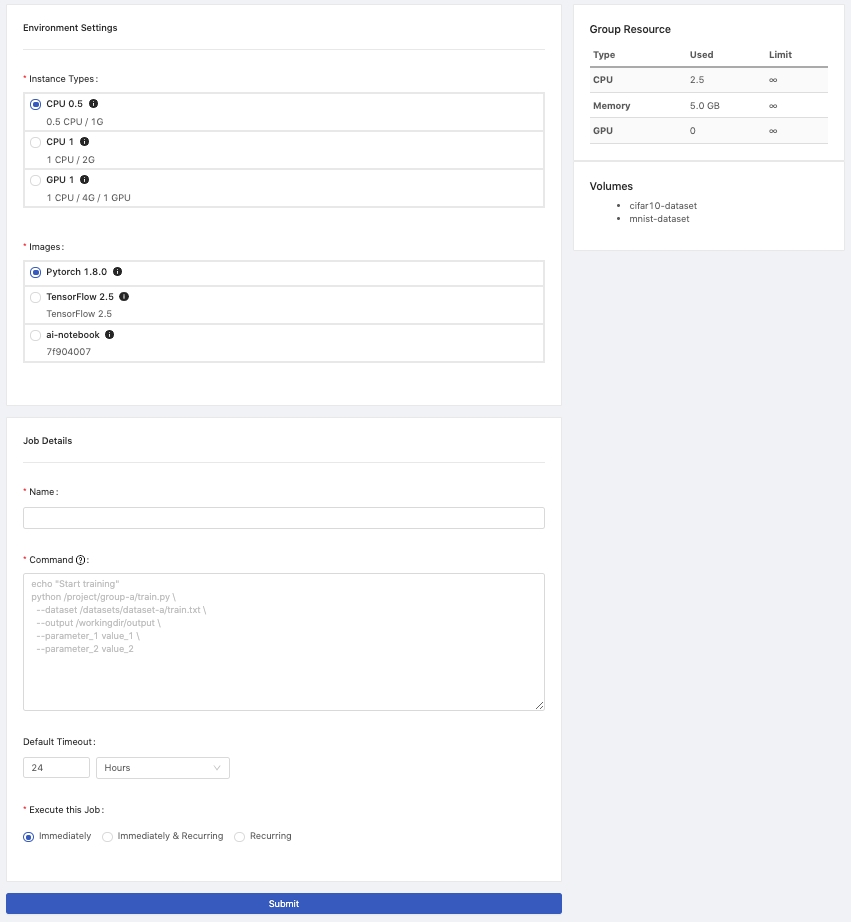
InstanceTypes: Select a instance type which allocates resources for the job.Images: Select an image which the job run bases on.Name: The name of the job.Command: The sequential commands of the job context.Default Timeout:Minutes/Hours/Days; a running job will be cancelled after the interval of time, the setting here will overwrite the setting from a Group.Execute this Job:Immediately/Immediately & Recurring/Recurring; directly execute this job AND/OR create a regularly executed recurring job.Submit: Click the button to submit the job.
Command
Users are able to run sudo apt <command> in a Job.
such as
sudo apt update
sudo apt install <package> --assume-yes
pip install <package>Directories/paths the job can access if directories exits:
Notice:The default working directory of a Job is under /home/jovyan; This is /home/jovyan inside Job Pod rather than /home/jovyan inside Notebook, therefore, files locating at /home/jovyan of Notebook don't exist here! There are <group volume> and <data volume> only mounted here in Job Pod.
/home/jovyan
A temporary working directory while jobs running. Note: saving data here will be lost when jobs finished.
/home/jovyan/<group> -> /project/<group>
Using this path (or Symbolic link) to access a group volume, load files and save output persistently. Note: a group volume is required, please consult administrators.
/home/jovyan/datasets/<data volume> -> /datasets/<data volume>
Using this path (or Symbolic link) to access a data volume, load data volumes which connect to the group. Note: a existing data volume is required, please consult administrators.
Environmental variables:
$PRIMEHUB_USER
Job's owner
$PRIMEHUB_GROUP
Job's group
Python command option
python -u we can use -u to force stdin, stdout and stderr to be totally unbuffered, so we can see logs in real time.
Example 1: There is a file, train_mint.py, stored in group volume, research, then we can execute the python file as a job like below. Since the python file is executed under /project/research, the data output by the job is saved under the path relatively.
cd /project/research/
python -u train_minst.pyExample 2: If we execute the job like below, the output data will be saved under /home/jovyan which is a temporary directory while the job is running. In other words, data saved under /home/jovyan will be lost.
python -u /project/research/train_minst.pyExecute this Job
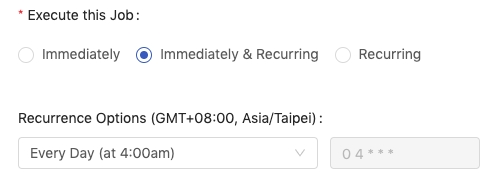
Immediately
The job will be executed immediately.
Immediately & Recurring
The job will be executed immediately and will be scheduled according to user's preference.
Recurring
The job will be scheduled according to user's preference.
The Recurrence Options is the rule of trigger recurrence. We can select one of presets of rules or customize a rule based on Cron syntax.
On Demand
Manually trigger a job.
Every Day (at 4:00am)
A preset; trigger a job at 4 AM everyday.
Every Week (Sunday at 4:00am)
A preset; trigger a job at 4 AM on Sunday every week.
Every Month (on the 1st at 4:00am
A preset; trigger a job at 4 AM on 1st every month.
Custom
Customize the rule of the trigger recurrence; "minute hour day of the month month day of the week"; 0 4 * * * represents 4 AM every day.
Limitation
The maximum execution time of a job is 24 hours. A job will fail if it exceeded the limit.
The log of a finished job will be preserved for 7 days. The log will be deleted after 7 days.
NOTE: Depends on the container runtime you use, the job container might be recycled before the 7 day limit. You might lost your log before the default expiration is reached
The status of a job (succeeded, failed, cancelled) will be preserved for 30 days.
The maximum number of jobs is 4000. If the maximum is exceeded, the oldest job will be deleted.